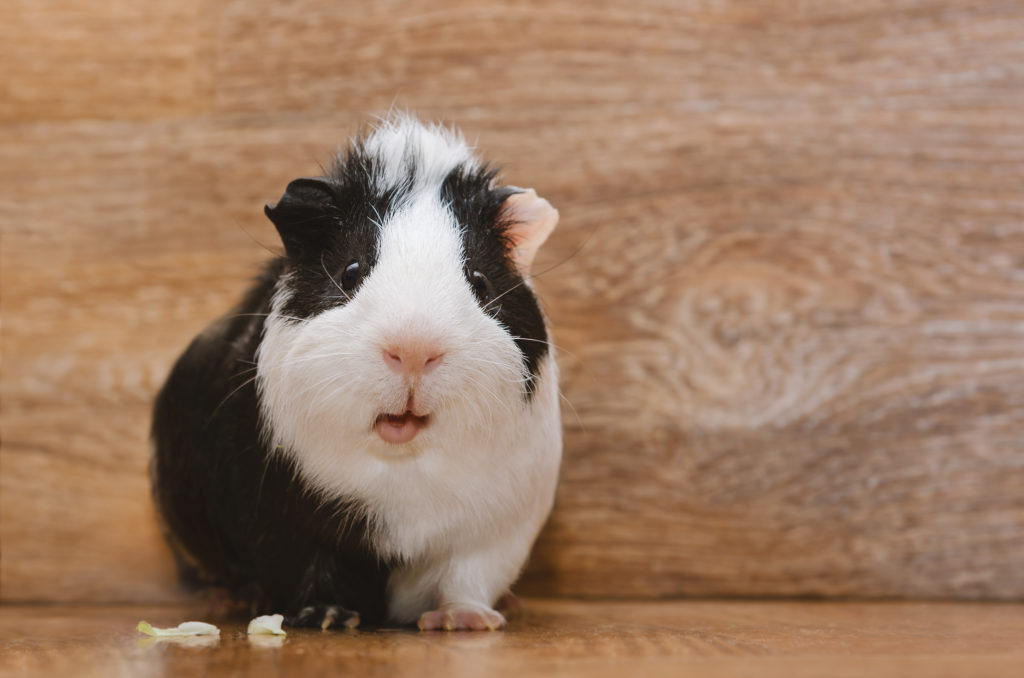If your child wants a pet and you’re not sure that your family is ready for a dog or a cat, you may want to start ‘small’ and add a guinea pig, hamster, or a rabbit to your family. Small animals make great companions for both young children and adults. The Healthy Pet Care Specialists at Global Pet Foods stores can help you with adopting a small animal.
While it may seem that small animals are easier to care for than dogs or cats, small animals still need daily care.
It’s important that your small animal gets used to you and other members of the household as soon as you bring them home. They also need to become accustomed to being handled. If your child is going to be the ‘primary’ caregiver, ensure that they are involved with the pet right from the beginning.
Feeding your new pet a small treat is a great way to have them warm up to you. When they’re comfortable with that, you can carefully pick them up with one hand supporting the bottom, the other over the back. Hold him for a short time at first, and then gradually increase your time with him.
The best way to safely approach rabbits is to start by stroking the top of their head. Do not offer your hand to a bunny to sniff in the same way that you would to a dog, because most seem to find this gesture offensive and may attack (lightning fast lunge with a snort). Most bunnies don’t like to have the tips of their noses or chins touched. Their feet also tend to be ticklish.
Teach your child to be very gentle with their new pet.
We often overlook the importance of providing daily activity for small animals – guinea pigs, hamsters, gerbils and rabbits – because they seem to enjoy the comfort of their cages. But they need companionship and activity for their overall health and wellbeing too. If you have multiple small animals, they will enjoy playing together. Small animals will also provide great entertainment when they start moving outside of their cages.
All small animals should partake in both physical and mental exercises every day. Most of the activities will relate to their burrowing and chewing instincts. A running wheel is the most important piece of equipment to ensure that hamsters or guinea pigs get daily exercise. Hamsters typically run a distance of about eight miles per night.
TIP: Buy a running wheel without an axle if your pet has a long tail.
Another popular toy that provides great exercise, mental stimulation and entertainment is a polycarbonate plastic ball. Your small animal will love the freedom and exercise as their legs give the ball motion to roll around the room. This allows them to be outside of their cage, and ensures they can’t escape! Your pet can overexert itself, so give them a rest after 15 or 20 minutes of being in the ball.
Small animals have natural burrowing and tunneling instincts, so a great option to facilitate this is tunneling equipment.
Although cardboard tubes from toilet paper and paper towels can be used, they will end up being shredded quickly. Buy a cage that is equipped with tunnels. Even ferrets are very curious and will love playing in tunnels (appropriately sized, of course!). Please ensure that the diameter of the components is the right size for your pets. It’s also important that the components are easy to remove and reassemble because you’ll need to clean and disinfect them on a weekly basis.
Some small animals, such as ferrets and rats like to climb. Adding bird perches, bird swings and climbing branches to their cages will encourage this. They may get chewed up, but that’s part of your pet’s play too!
Gnawing is a favourite activity for small animals. To help maintain your small animal’s dental health, ensure that you provide chew toys. There are vegetable flavoured or plain wood chew toys in a variety of shapes, colours and sizes available, as well as hard alfalfa cubes. Some pets, like bunnies, guinea pigs and chinchillas must chew. Their teeth keep growing just like your hair and fingernails do. Gnawing is how they keep their teeth trimmed. With trim teeth, they can keep chewing their food. Without chew toys they will chew on the food bowls and even on their cages. Hamster’s teeth grow continuously, so your pet will need to chew – a lot – to keep their chompers in tip-top condition.
Harnesses and leads work well with ferrets. Even bunnies and guinea pigs can be harness-trained when they are young. Harnesses and leads allow you to take your pet outside and keep them from getting away from you and from getting into things. Most harnesses can be adjusted to fit the size of your small animal.
Be sure to provide the appropriate food for your small animal and water every day. Check the cage for chewed or damaged areas, where your pet could escape. Remove any old food and check the toys to be sure they are still working and in good condition. Your small animal’s cage should be kept in a safe and comfortable area in your home; cages should not be placed in drafty areas or in direct sunlight.
Global Pet Foods has a wide variety of products suitable for small animals. We can help you select the right products that are appropriate for your pet and provide you with guidance on caring for your small companion.












